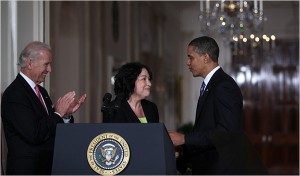
I have a piece up in the Guardian about how identity and experience shape the courts, and how Sotomayor’s professional and personal experiences add a necessary diversity to the Supreme Court bench. A taste:
Republicans and conservatives will argue that [Sotomayor’s] nomination is an exercise in affirmative action, and that Barack Obama has effectively posted a “White males need not apply” sign on the doors of the supreme court – a funny complaint about an institution that is almost entirely white and male. Democrats and liberals will predictably trip over themselves arguing that Sotomayor’s race and gender don’t matter, even while race and gender matter.
The reality, of course, is that every supreme court justice comes in with a set of life experiences that are shaped not only by race and gender, but by experiences both professional and personal – it’s just that few people consider that whiteness and maleness are not neutral identities and may shape one’s perspectives and legal opinions just as much as femaleness or non-whiteness. Sotomayor herself has said: “I would hope that a wise Latina woman with the richness of her experiences would more often than not reach a better conclusion than a white male who hasn’t lived that life.” And she’s right.
While that quote is sure to be brought up as evidence that she’s a “liberal activist”, it’s more indicative of the kind of self-awareness and reflection we want in a supreme court justice.
Judges have a marked historical tendency to move left over their supreme court tenures. There remains quite a bit of debate over why there’s such a pronounced liberal shift, and it is no doubt a complex phenomenon. But I suspect it has to do in part with a slow realisation that the law has a real impact on peoples’ lives, and that the law school classroom model of the law as a near-science and justice as consistency is fundamentally flawed and entirely unrealistic. “The law” as an academic exercise is certainly interesting, but one’s view is bound to shift when, as supreme court justice Anthony Kennedy put it, “suddenly, there’s a real person there.”
I think Holly and I were on the same wavelength (I was writing this article while she was writing her post) when it comes to “identity politics” and Sotomayor, so if for some strange reason you haven’t read her post below, you should do it. She fleshes out the idea more thoroughly than I did in my article (oh, to have a brain like Holly…). Enjoy.